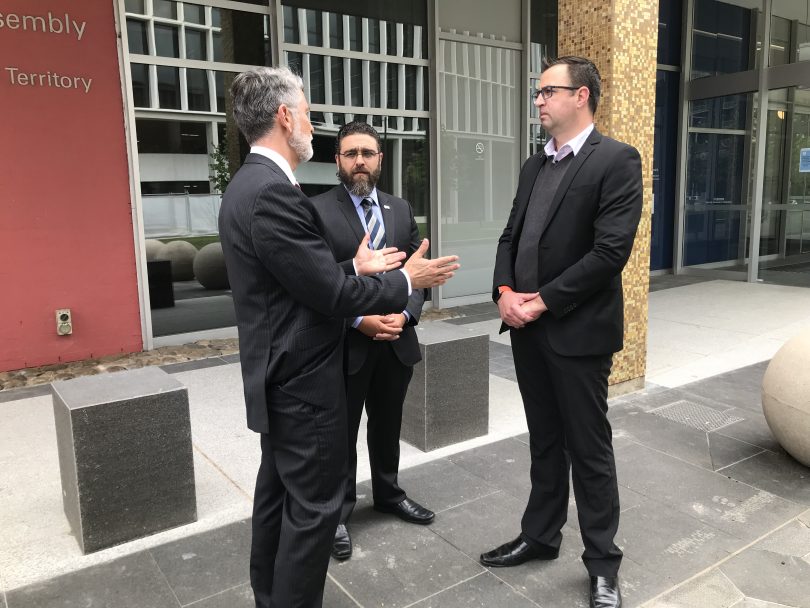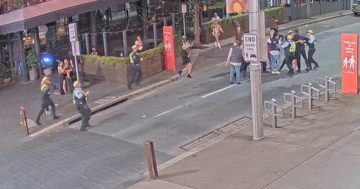
Opposition spokesperson on police Jeremy Hanson, AFPA president Alex Caruana and former police officer Jason Taylor. Photo: Lottie Twyford.
A proposal to make it more difficult for people accused of assaulting frontline workers to get bail was rejected yesterday by the ACT Government.
Attorney-General Shane Rattenbury said he feared the proposed amendment, which would mean people who assault a frontline worker would not automatically be granted bail, may lead to miscarriages of justice, increase the overrepresentation of vulnerable people in the court system and could seriously impinge on a person’s human rights.
The Australian Federal Police Association and former police officer Jason Taylor – who was violently attacked with his back turned while on duty last year – said the government’s decision was “not good enough”.
Opposition spokesperson on police Jeremy Hanson, who introduced the bail bill in August to “provide greater protection from assault to police, ambulance and other emergency workers”, was also disappointed.
Mr Rattenbury said the government could not support the amendment for several reasons, among them what he described as a “mischaracterisation of the ACT’s bail system”.
He’s also concerned the term ‘assault’, to which this amendment pertains, covers too broad a range of offences, including minor ones such as spitting to major ones such as striking a person.

Attorney-General Shane Rattenbury said the bill could pave the way for miscarriages of justice and increase the overrepresentation of vulnerable people in the justice system. Photo: Michelle Kroll.
Mr Rattenbury went on to tell the Assembly yesterday there is no evidence those charged with assaulting a frontline community service provider have any greater risk of reoffending or failing to appear in court, and therefore, there is no reason to justify the removal of the presumption for bail.
Mr Rattenbury also does not believe there’s any evidence the bill would improve community safety, saying the opposite may instead occur as “the evidence clearly shows that heavy-handed carceral policies only serve to increase crime”.
The government is also concerned that the bill may unfairly target Aboriginal and Torres Strait Islander community members and those with mental illness as these people have higher levels of contact with frontline community service providers.
“There is a real potential for the amendments proposed in this Bill to exacerbate structural disadvantages in the criminal justice framework,” Mr Rattenbury said.
Speaking yesterday (10 November), Mr Hanson said to “make an assumption that Indigenous people are more likely to assault police officers is outrageous”.
He also accused the government of failing first responders, saying “it’s our police officers that are calling for this”.
Former police officer Jason Taylor suffered PTSD and retired from ACT Policing after being attacked from behind during a routine arrest in January 2020.
He said he was “disappointed and angry” with the government’s decision to reject the bill.
“I saw this bill as the beginning of a vast wave of reform required in the legislative and mental health space in relation to first offenders, and it’s not good enough,” Mr Turner said.
“This government has failed to back its first responders.”
The AFPA accused the government of putting the rights of offenders before those of police officers, with president Alex Caruana saying the messaging around harming police officers needs changing.
“We strongly reject and we strongly feel that the message that should be out there is that if someone does harm a police officer, there will be stronger penalties in place,” he said.
In recent months, there has been a spate of violent incidents in Canberra and the surrounding region in which police officers have been injured in the line of duty.
Three weeks ago, an officer was hurt when a man allegedly drove a stolen car at a police vehicle; a 30-year-old Canberra man is accused of running his car into three police officers in July, leaving all seriously injured; while three men were arrested after an incident that saw a police officer hurt so badly he may never work again.
Driving at police and damaging a police vehicle carries a maximum prison sentence of 15 years and five years respectively, while assaulting a “frontline community service provider” carries a maximum of two years in prison.





















